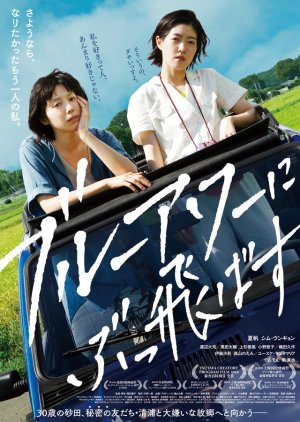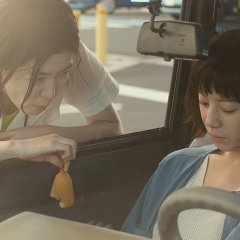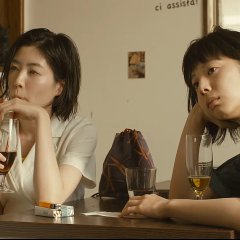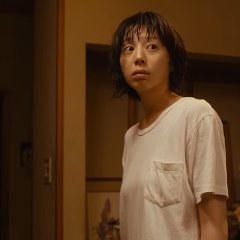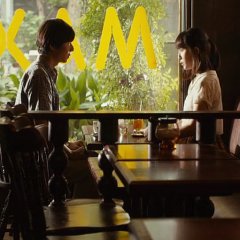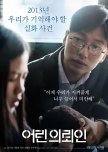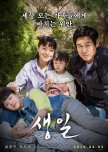- Italiano
- English
- magyar / magyar nyelv
- dansk
- Titolo Originale: ブルーアワーにぶっ飛ばす
- Conosciuto Anche Come: Buru Awa ni Buttobasu , Jump Into The Blue Hour , ブルーアワー , Buru Awa , L'heure Bleue
- Sceneggiatore & Regista: Hakota Yuko
- Generi: Drama, Famiglia
Cast & Ringraziamenti
- Kaho Ruolo Principale
- Shim Eun Kyung Ruolo Principale
- Watanabe DaichiTamada AtsuiRuolo di Supporto
- Yusuke SantamariaTogashi AkiraRuolo di Supporto
- Kuroda DaisukeSunada SumioRuolo di Supporto
- Shimada Kyusaku[Actor of great consequence]Ruolo di Supporto
Recensioni

"Bye-bye!"
(JFF Sydney 2019) Hakota Yuko's debut film centres around the coming of age of a disillusioned career woman undergoing a quarter life crisis.Sunada Yuka's loneliness and repressed discontent are interwoven into the fabric of the film and are a testament to how unhappiness doesn't have to stem from external circumstances; after all, Sunada has a well-paying (albeit patronizing and insecure) job, a comfortable house and a nice husband. The moral tonic at the core of the film is simple and universal but of high importance; that only by relinquishing emotional burden can we confidently face the future and establish control over our own lives. To detest sentimentality (or 'tackiness', as Sunada calls it)- by looking on our pasts with shame or regret, and refusing to reveal our vulnerabilities to others is to invite the hardening of our hearts and the accumulation of a discontent that can't be quenched by beer, loud karaoke and adultery.
My only complaint about the film is that the progression of the story at times was uneven and a bit jolty, especially during the road trip to Ibaraki. Sometimes it has a tendency to awkwardly drift for a bit. Overall, though, it felt very well integrated with symbols and motifs used cleverly throughout. Among these was the titular Blue Hour- a liminal period of time that reflected both Sunada's state of transition and her subconscious wistful feelings towards the childhood that she tries to banish from her mind. Another nice touch was the focus on flowers, which I took as another potential symbol for Sunada's situation- cut off from their origin stem, they initially seem fine immersed in water, but can only survive so long before they start to wilt.
The ending seems to have generated mixed opinions but it is certainly one of the best I've seen to date in a film. The final twist ties everything together so well, and adds a note of sadness when one thinks about the film in retrospect. I doubt this review is going to be read but I advocate for anyone who has viewed/ will view this film to think upon the implications of the ending, as Director Hakota encouraged me to do so when I asked her about it in the Q and A.
Someone at the screening made a comparison to Hirokazu Koreeda's style of filmmaking and I think there is merit in this. Much of what the film is trying to convey is created without words- rather, through awkward silences, physical gestures and the occasional but powerful outburst of raw emotion. I've stated this all too many times, but Kaho (who gives one of her best performances here) really proves her prowess when given complex roles- she displays powerful emotions that aren't necessarily given the chance to fully surface, but they are ever present and when they do surface, it is with heartfelt poignance. It would be a crime not to commend Shim Eun Kyung for utterly nailing her character despite Japanese not being her main language- Kiyoura was the perfect foil to Sunada, and Eun Kyung's infectious sense of delight helped alleviate the often melancholy mood. Kaho and Eun Kyung had fantastic chemistry, which was a given as Director Hakota mentioned that the three of them had spent a lot of time off-set together as well.
The other performances were also amazing, notably from every member of Sunada's odd and somewhat dysfunctional family. The country bumpkins were brought to life, not as morally upright contradictions to Sunada's resentment, but as people just as flawed as Sunada herself. Sunada's brother (Kuroda Daisuke) was a highlight because of the dark humor he provided in his few minutes of screentime- there was clearly something wrong with him but he was still funny nonetheless.
For anyone who has parents/grandparents that they've come back to after a long time away, this film is bound to be highly relatable. For anyone else, this film is still a must watch... if you can somehow track it down. Hopefully it sees a wider release in English by some chance. Let's hope that Director Hakota's next release is just as good.
Questa recensione ti è stata utile?

